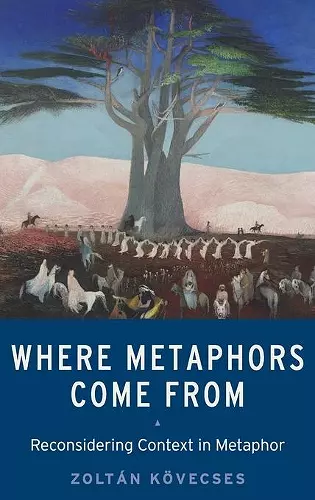Where Metaphors Come From
Reconsidering Context in Metaphor
Format:Hardback
Publisher:Oxford University Press Inc
Published:12th Mar '15
Currently unavailable, and unfortunately no date known when it will be back
This hardback is available in another edition too:
- Paperback£40.99(9780190656713)

In Where Metaphors Come From, Zoltán Kövecses proposes a metaphorical grounding that augments and refines conceptual metaphor theory according to which conceptual metaphors are based on our bodily experience. While this is certainly true in many cases of metaphor, the role of the body in metaphor creation can and should be reinterpreted, and, consequently, the body can be seen as just one of the several contexts from which metaphors can emerge (including the situational, discourse, and conceptual-cognitive contexts) - although perhaps the dominant or crucial one. Kövecses is a leader in CMT, and his argument in this book is more in line with what has been discovered about the nature of human cognition in recent years; namely, that human cognition is grounded in experience in multiple ways - embodiment, in a strict sense, being just one of them (see Barsalou, 2008; Gibbs, 2006; Pecher and Zwaan, 2005). In light of the present work, this is because cognition, including metaphorical cognition, is grounded in not only the body, but also in the situations in which people act and lead their lives, the discourses in which they are engaged at any time in communicating and interacting with each other, and the conceptual knowledge they have accumulated about the world in the course of their experience of it.
This newest addition to the Kövecses canon will stand as one of his most engaging and conclusive works. Thus, it is highly recommended for all metaphor researchers and scholars. For a broader readership, the book is engaging as well as pedagogical. Thus, it is highly recommended as a fine overall introduction to the cognitive linguistics of metaphor and as an exceptional overview of the important roles of culture, history, and of course, context in figurative communication. * Robert R. Hoffman & Yorick Wilks, Metaphor and Symbol *
[Kövecses] provides good examples from a variety of contextual and cultural situations and includes several chapters on the cognitive aspects of linguistic humor. Recommended. * P. J. Kurtz, CHOICE *
ISBN: 9780190224868
Dimensions: 155mm x 236mm x 28mm
Weight: 440g
232 pages